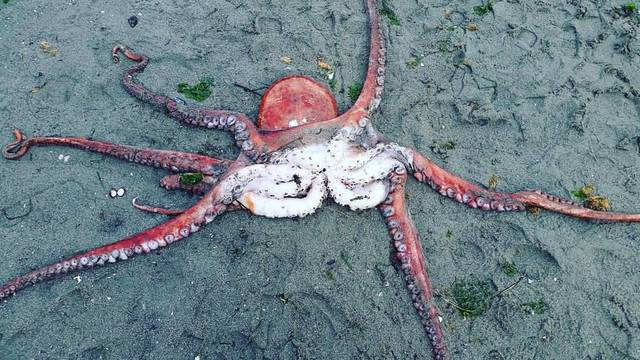by KAT BARNARD
Sounder reporter
The bright red octopus found on Crescent Beach in early October was not the first, or the last. This giant Pacific Octopus lives in the Salish Sea, all around the San Juan Islands and the Puget Sound, and grows up to 150 pounds and 15 feet across.
The life of the largest octopus happens to be a short one; they only live three to five years and they mate at the end of their life. The female octopus will care for her eggs that are hanging in her den for five to eight months and then she dies.
In most cases, the body of the giant octopus will stay at the bottom of the ocean and get eaten by a variety of other organisms. Occasionally, though, one will float up onto the beach.
Several times a year, a giant Pacific Octopus is found on the beaches of the Salish Sea. Unfortunately, the reason why they are found on the beach is not known.
Joe Gaydos, the chief scientist for the SeaDoc Society, mentioned that there are organizations that collect data for marine mammals and birds that wash up on the beaches, but there is no network to collect and analyze data of invertebrates and fish.
The octopus that washed up on Crescent Beach was viewed by Orcas Island High School biology students who did some research themselves. Student Millie Kau discovered that a person can tell a male octopus from a female octopus by looking at the tip of its third arm on the right because males have a special tip on this arm that has no suckers on the last few inches.
While the students are looking forward to learning more about this local invertebrate, some issues about the giant Pacific Octopus have arose in recent years since some areas in the Puget Sound allow octopus harvesting. Most areas are protected and harvesting is banned, but the protected areas allow for these magnificent creatures to hide in their dens and dominate the sea floor.
Here in the San Juan Islands, one must have a scientific collection permit to take an octopus off the beach. So, next time one is spotted, take some pictures and call the SeaDoc Society to report it. Someday, with more data, we may know more about the possible deaths and disease of the giant Pacific Octopus.



